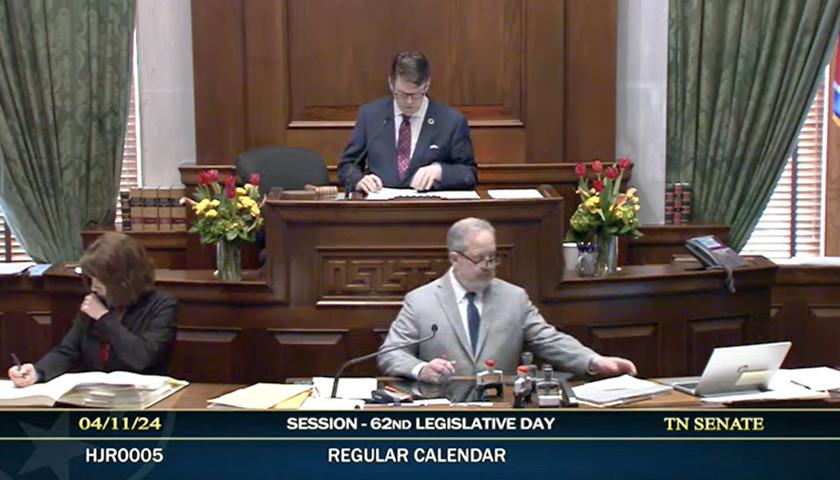Live from Music Row Friday morning on The Tennessee Star Report with Michael Patrick Leahy – broadcast on Nashville’s Talk Radio 98.3 and 1510 WLAC weekdays from 5:00 a.m. to 8:00 a.m. – host Leahy welcomed all-star panelist Crom Carmichael in-studio to examine Senator Nicely’s recently proposed bill that requires a residency quota before running for U.S. Congress in the state of Tennessee.
Leahy: We have a fascinating bill in the Tennessee General Assembly that, if it makes it through, if the leadership doesn’t quash it, could create a fascinating constitutional conundrum or challenge. Do you like that?
Carmichael: I like that.
Leahy: I’d call this bill the Protection Against Carpetbaggers in Tennessee Act.
Carmichael: That’s the real formal name.
Leahy: It’s a bill introduced by a state Senator, Frank Nicely, that would require a three-year state residency before running to represent Tennessee in the United States House of Representatives.
It is, SB 2516 is the number of the bill. What’s interesting about this, Crom, is remember we talked about the supremacy clause of the Constitution, which says if there’s a conflict between a federal statute and a state statute, always the federal statute is supreme.
That’s right there in the Constitution. Now, what’s interesting about this is, so here we have in the state of Tennessee, as state Senator Nicely says, if you want to run for governor, you have to have been a resident for like seven years of the state.
That’s a state office. If you want to run for state Senate, you have to be a resident, I think like three years, and the same for the state House. The Constitution of the United States says if you want to run for Congress, you just have to be a resident of that state and you can run in any district you want.
Historically, there have been challenges to that, and some states have put limits on things like residency and other things. And there was a Supreme Court case back in 1995 that was decided very narrowly in a five-four case.
Clarence Thomas was one of the dissenters on this. The case was called U.S. Term Limits Inc. v. Thornton. And in that case, Arkansas had a state law that said you could only serve three consecutive terms in Congress.
The Supreme Court ruled 5 to 4 that the Constitution did not allow that. But there was a stunning dissent by Clarence Thomas on it. They didn’t try the issue of residency. It was a different standard.
Carmichael: Oh, that’s interesting, though.
Leahy: It is interesting. But listen to what Clarence Thomas had to say about that: In his dissent, they said in that case, the issue was, can a state impose term limits on people who are running for Congress?
And 5-4, they [voted] a state cannot do that. So this is the precedent that the opponents of the Protection Against Carpetbaggers in Tennessee Act would put forward. Clarence Thomas said in a dissent he disagreed with it.
If this bill here were to be passed in the law and go to the Supreme Court, it was likely that Clarence Thomas would vote in favor of allowing that bill to stand. He said, “It is ironic that the court faces today’s decision on the right of people to choose whom they please to govern them. Under our Constitution, there is only one state whose people have the right to choose whom they please to represent Arkansas in Congress.
“Nothing” – you could substitute Tennessee there in this case – “nothing in the Constitution deprives the people of each state of the power to prescribe eligibility requirements for the candidates who seek to represent them in Congress. The Constitution is simply silent on this question.”
Carmichael: Clarence Thomas was obviously agreed with by three other Supreme Court justices.
Leahy: 1995. So we’re talking 27 years ago.
Carmichael: If it got to court, it would be interesting to see if the court were to side with Senator Nicely’s law, which is an interesting question. I’d have to think about it. But I have a great deal of respect for Senator Nicely.
And so I know he has thought deeply about it or he wouldn’t be offering it. He’s not a frivolous guy. So it’s an interesting question. But if the bill did pass in Tennessee and it ended up in the Supreme Court, and the Supreme Court voted in support and said that what Tennessee is doing is constitutional, it would likely then open up the floodgates for term limits.
Leahy: Term limits.
Carmichael: Now, term limits are different. I will say this. That’s different from the requirements on what it takes to run. Exactly.
Leahy: I think that’s how they would frame this law so that they wouldn’t have both of them. In dissent, Clarence Thomas, Chief Justice Rehnquist, Sandra Day O’Connor, and Antonin Scalia. That’s a pretty strong group. In favor of that 5-4 decision. John Paul Stevens, not my favorite justice.
Ginsburg. It’s ironic that Ginsburg was in the majority there, because she performed the wedding ceremony of one of the Morgan Ortagus, who would be influenced by this decision. Steven Breyer and Anthony Kennedy.
Carmichael: If the bill passed, I don’t think it would apply to this race. Would it?
Leahy: Yes, it would. It would apply to this race because it would apply immediately, which means it would apply to the August 2022 primary. Fascinating.
Carmichael: Okay. Well, we shall see.
Leahy: We shall see. Let me just say this: I think this is a good point. I think it’s a fight the leadership doesn’t want to have.
Carmichael: Whether or not it makes its way through is another question. The Republican Party and our leadership are focused on two or three big things. And they also have to grapple with the governor’s budget.
Leahy: They have a $52 billion budget.
Carmichael: They have a lot of work to do there.
Leahy: A 25 percent increase from last year.
Carmichael: That’s a large one. And for me, the biggest question is so much of that increase is federal money, and that federal money is likely to not stay. So it’s my hope that the big increase is not funding ongoing programs, but it’s funding, at least with the federal money, one-time deals in that way. If the federal money goes away, we’re not locked into something that we then would have to later repeal.
Leahy: I was going to say something very nice about a member of the Lee administration – Butch Ely, the head of finance and administration. A good personal friend of mine. A very great guy. He was just named also deputy governor. Congratulations, Butch!
– – –
Tune in weekdays from 5:00 – 8:00 a.m. to The Tennessee Star Report with Michael Patrick Leahy on Talk Radio 98.3 FM WLAC 1510. Listen online at iHeart Radio.
Photo “Robby Starbuck” by Robby Starbuck.









What a wonderful opportunity to establish a reasonable standard for holding office. I am tiring of Johnny-Come-Lately folks turning my state blue. They destroyed theirs and now want to do the same to Tennessee. Al one as to do is look at Colorado as a prime example. I include Lee’s atrocious pick of Penny Schwinn in this group although I RINO governor invited her.